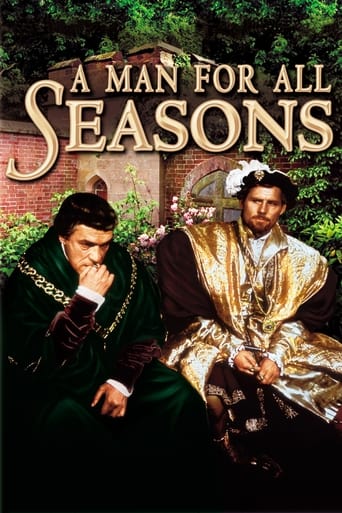

A Man For All Seasons4 And A Half Out Of 5A Man For All Seasons is a character driven feature of a man who will not and does not take "yes" for an answer. There are very few features that bleeds excellence in every form of it and touches the long lasting perfect note that not only is brilliant but essential to cinema; this is one of it. It is rich on technical aspects like costume design, production design, background score, sound department and editing. The dialogues in here are memorable, thought-provoking and goose-fleshing, as the intensity outgrows potential for the protagonist and at his vulnerability the argumentative conversations written in here can cut through any form of energy. The writing by Robert Bolt is undeniably strong and gripping, keeping the audience on the edge of the seat and leaves them in awe of it. Fred Zinnemann; the director is in his A game communicating with the audience through his brilliant execution skills as the emotions pours out of the screen like rain and makes it almost impossible to not be effected by it; especially in its last act. The performance objective is scored majestically by the protagonist Paul Scofield and a brilliant supporting cast like Robert Shaw and Wendy Hiller. A Man For All Seasons is a feature for all generations as it is layered with multiple emotions that can be explored through the craft present in each frame of it.
... View MoreAlthough Paul Scofield's performance is Oscar-deserving, overall this one is not worthy of the "Best Picture" Academy Award it won. Some of the casting could have been better. Orson Welles appears drunk and does not play Wolsey nearly as well as Anthony Quayle in Anne of a Thousand Days. Leo McKern is not as convincing as Thomas Cromwell as was John Colicos in that movie. Robert Shaw gave a poor performance as Henry VIII - his spitting at the mouth during his loud ranting, and maniacal laughing at other times was over-the-top and made the ruthless but shrewd king appear to be insane. The comment at the end that Henry died of syphilis is not historically accurate. However, most of the rest of the cast (for example John Hurt) perform very well. History reveals Thomas More to be clever and pious, but also stubborn and self-righteous, so his portrayal in the movie is historically accurate. The movie is for the most part well- written and the cinematography is very good.
... View MoreEngland, 1520s. King Henry VIII is in power and wants to marry Anne Boleyn. His current wife, Catherine of Aragon, seems unable to bear him a son and heir and he's besotted with Ann Boleyn. He wants to divorce Catherine but, other than the Pope, the main impediment is Sir Thomas More, a pre-eminent legal authority and devout Christian. More is eventually made Lord Chancellor, one of the highest positions in government. He resigns this position out of protest against the King's plans to go ahead with the divorce. Surely, now that he is out of government and out of the limelight, as long as he doesn't air his views, his principles aren't a threat to the King's plans and he is safe from prosecution?Directed by Fred Zinneman (High Noon, From Here to Eternity, The Search) a wonderfully lavish production. A noble sentiment too - a man willing to stand by his principles no matter what the cost.However, the film moves along at a snail's pace, has excess dialogue and ultimately feels quite padded. Also doesn't help if you know history (and/or, like me, have seen The Tudors) and know how everything will end up.There are moments of relief among the verbosity. Any time More is in an argument on points of law, his sharpness of mind, knowledge of law and expert use of the English language shine through - his wordplay is something to behold.Won the Best Picture Oscar in 1967.
... View MoreThe screenplay of this excellent historical drama of 16th century England was written by Robert Bolt, who based it upon his revised 1960 play. In the opening scene Lord Chancellor Cardinal Wolsey (Orson Welles, who has two scenes) has summoned counselor Thomas More to his office. What Wolsey really wants is More's help concerning the imbroglio involving King Henry VIII. The king, although presently married to Catherine of Aragon, wants to divorce her for his mistress Anne Boleyn. More responds that the Pope allowed Henry VIII's dispensation so that he could marry Catherine, his dead brother's widow. More says, (Now) "he asks the Pope to dispense the dispensation for state reasons." No, More will not assist Wolsey in his dilemma. The lustful Henry wants a son as heir and does not have one with Catherine. Of course, Anne Boleyn happens to be fifteen years younger than she. More further tells Wolsey, "I think that when statesmen forsake their own private conscience for the sake of their public duties, they lead their country by a short route to chaos."Will Roper (Corin Redgrave) wants to marry Meg (or Margaret = Susannah York), one of Thomas More's daughters. More refuses as Roper tends towards Lutheranism. Meg is strictly Catholic, like her family. Alice (Wendy Hiller), More's wife agrees with Thomas. Later, Roper will moderate his views and will marry Meg. In his real lifetime, Roper remained Catholic.Time passes. The Duke of Norfolk, Earl Marshal of England (Nigel Davenport), rides to the residence of Wolsey, who's dying of disease. Norfolk grabs Wolsey's gold chain, the symbol of his Chancellery position. Norfolk tells Wolsey he's lucky he's dying, as the king would have him imprisoned in the Tower of London. Obviously Wolsey has failed in his appeal to the Pope on Henry's behalf. Sir Thomas More is Wolsey's successor.On a sunny summer day, King Henry VIII (Robert Shaw) and his entourage travel by boat to Chelsea, More's estate. A feast is laid out indoors. But Henry's real purpose is to convince More to agree with his plans to divorce Catherine and marry Boleyn. Outside, the king says he is More's friend. He also states that he was not really married to Catherine. More is neutral and tells Henry that it is a matter for the Pope. As Henry cannot get More's support he raises his voice for all inside to hear. He then lies and says he will let More alone. "I have no queen! Catherine's not my wife. No priest can make her so. They that say she is my wife are not only liars but traitors! Yes, TRAITORS!" Then quietly, Henry continues, "See! You see how you maddened me?" We comprehend how dangerous the megalomaniac Henry really was. To catch the late tide, Henry's group leaves without dining. Thomas Cromwell (Leo McKern), new Secretary to the Council, is dangerous too. Cromwell takes in Sir Richard Rich (John Hurt), a faithless man of disgustingly weak character (a real historical person). He wants Rich to provide him information about More. In turn Cromwell offers him the position of Collector of Revenues for York. The plot against Thomas More has begun despite King Henry's previous assurance to the contrary.Time passes. At the Canterbury Convocation, a herald acting for the king extorts one hundred thousand pounds from the gathering of bishops and priests for perceived misbehaviors. (Their properties were also confiscated.) Furthermore he queries whether they will break from the "PRETENDED See of Rome" and acknowledge Henry the title "Supreme Head of the Church in England." In other words, buckle or else (those that didn't suffered immeasurably). By breaking with the Roman Catholic Church, Henry feels it's his divine right to become the spiritual leader of England (!) as well as its political sovereign. At this point More resigns his position as Lord Chancellor (after three years of faithfully serving the king). He remains tight-lipped. More releases his household staff while Roper blasts the king's actions. More later tells Norfolk that the Pope is a descendant of Peter, the only link from Christ. The king remains adamant and wants More to bless his latest marriage. As More does not, he offends the king's supporters. Norfolk tries to convince More to concede, but the latter is a man of conviction. Norfolk retorts, "This isn't Spain, you know. This is England!" Time will expose the irony. Then the King's Parliament passes an extreme act that if one refuses the oath of the king's marriage, he is branded a traitor and executed. More later says that this " . . . is directly repugnant to the law of God, and his Holy Church."So the last quarter of the movie focuses on More's shameful imprisonment in the Tower (a dripping cell) and subsequent trial. More advises his family to leave the dreadful country. But he has reasoned that he cannot be harmed by refusing the Supremacy oath as his enemies cannot prove his objections. Remaining devoted to his Church, More has a conscience and knows he will be judged by God. When he first walks into the trial chamber perceive how the court atmosphere is all stacked against him. The corrupt magistrates disregard proper protocol. Repulsive Richard Rich will commit perjury with worthless feedback. More retorts against the wicked fellow, "Why Richard, it profits a man nothing to give his soul for the whole world, but for Wales?" Nevertheless, the dutiful More will quickly be found guilty and sentenced to surrender his head. "I die his Majesty's good servant but God's first." Saint Thomas More, a venerated Catholic saint, was a gem. He championed "charity, modesty, justice, and thought" against evil. Incidentally, he wrote "Utopia." Paul Scofield terrifically reprised his stage role as the beleaguered counselor. The film stands the test of time as one of the greatest films in British cinema history. The Oscar winner for Best picture, it presents wonderful performances and period costumes and sets.
... View More